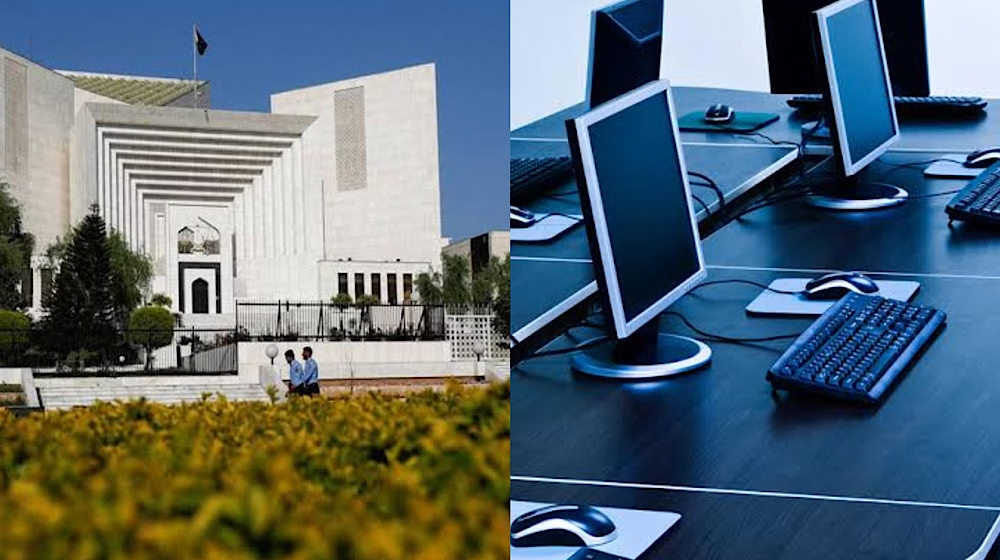The Supreme Court of Pakistan has taken a historic step toward judicial modernization with the formal launch of the E-Office system and the signing of a Memorandum of Understanding (MoU) between the Law and Justice Commission of Pakistan (LJCP) and the National Information Technology Board (NITB). This initiative reflects the judiciary’s broader vision of embracing digital transformation to ensure transparency, efficiency, and accountability in judicial processes.
Supreme Court of Pakistan Embraces Digital Transformation
The Supreme Court of Pakistan is moving toward paperless governance through the E-Office system, which will automate internal workflows, reduce paperwork, and streamline case management. With digital case handling and real-time monitoring, this system is designed to address long-standing challenges such as case backlogs and delayed file movement.
The MoU between LJCP and NITB further strengthens this initiative by laying the foundation for an advanced Analytical Dashboard for the Judiciary. This digital platform will consolidate data from across justice sector institutions, enabling a comprehensive view of case progress, backlog status, and performance indicators of the National Judicial (Policy Making) Committee (NJPMC).
Key Objectives of the E-Office System in the Supreme Court of Pakistan
The launch of the E-Office system in the Supreme Court of Pakistan is not merely about digital record-keeping but about creating a technology-driven ecosystem for the judiciary. The key objectives include:
- Paperless Workflow: Automating file movement and communication between departments.
- Real-Time Monitoring: Tracking case progress and judicial performance with accuracy.
- Data Integration: Consolidating information from multiple judicial and legal institutions.
- Transparency & Accountability: Ensuring that reforms are evidence-based and measurable.
- Judicial Efficiency: Reducing case backlog and expediting justice delivery.
This modernization aligns with global best practices in judicial digitalization, allowing Pakistan’s judiciary to keep pace with international standards.
Supreme Court of Pakistan’s Vision for Judicial Digitalization
Chief Justice of Pakistan, Hon’ble Mr. Justice Yahya Afridi, emphasized during the launch ceremony that judicial digitalization is essential to ensure access to justice for all citizens. He noted that the adoption of technology will reduce systemic inefficiencies, empower judges with better case management tools, and ultimately strengthen public trust in the judiciary.
The Federal Minister for Information Technology and Telecommunication, Ms. Shaza Fatima Khawaja, highlighted that digital transformation in the judiciary will complement the government’s broader vision of e-governance and smart governance across Pakistan.
Benefits of the E-Office System for Citizens
The implementation of the E-Office system in the Supreme Court of Pakistan is expected to benefit not only judges and lawyers but also ordinary citizens. Some of the key benefits include:
- Faster Case Disposal – Streamlined processes will reduce unnecessary delays.
- Transparency in Proceedings – Real-time digital tracking ensures accountability.
- Reduced Paper Dependency – Environmentally sustainable and cost-efficient operations.
- Accessible Case Information – Citizens and stakeholders can monitor updates more easily.
- Evidence-Based Reforms – Judicial decisions and reforms will be guided by accurate data.
According to recent statistics by the Law and Justice Commission, Pakistan currently faces a backlog of over 2.2 million pending cases across various courts. The new system aims to significantly reduce this burden by automating case flows and improving monitoring mechanisms.
Supreme Court of Pakistan Leading by Example
The launch ceremony was attended by key figures including Chief Justice Yahya Afridi, Justice Muhammad Ali Mazhar, Justice Shahid Waheed, Justice Miangul Hassan Aurangzeb, and Justice Ali Baqar Najafi, alongside senior officials from LJCP and NITB. Their collective commitment underlines that the Supreme Court of Pakistan is leading by example in adopting digital governance.
The creation of a case management system tailored for judges is already under development. This feature will further enhance judicial performance by giving judges access to well-structured case data, minimizing delays caused by manual processes.
Future of Judicial Digitalization in Pakistan
The Supreme Court of Pakistan is setting a precedent for lower courts and other institutions within the justice sector. As the E-Office system evolves, it is expected to extend beyond the Supreme Court, eventually transforming the operations of High Courts and District Courts.
By integrating technology at all levels, the judiciary will be able to tackle challenges such as inconsistent case tracking, lack of coordination among institutions, and limited accessibility for citizens. This marks a shift from traditional bureaucratic practices toward a transparent, citizen-centric justice system.
The launch of the E-Office system in the Supreme Court of Pakistan represents a defining moment in the country’s judicial history. By embracing digital solutions, the judiciary is taking proactive measures to improve efficiency, reduce backlog, and strengthen transparency. With the support of LJCP, NITB, and government leadership, this initiative promises to create a more accountable and accessible justice system for Pakistan’s citizens.
As judicial digitalization progresses, the Supreme Court of Pakistan is not only modernizing its internal processes but also reinforcing public confidence in the judiciary—laying the foundation for a truly technology-driven future of justice in Pakistan.



